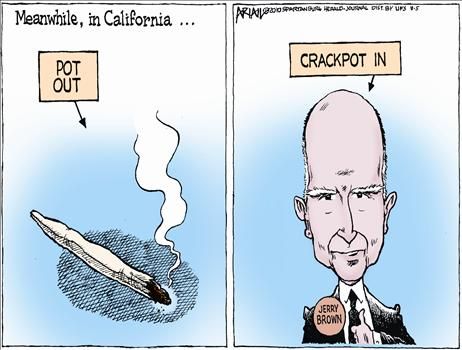The Corner points out that the majority of likely voters describe Obama as a socialist in a new poll from
Democracy Corps, James Carville's outfit:
- When LV were asked what words or phrases describe Obama they responded in the following way:
- Too liberal (describes well/does not describe well): 57 / 38
- A big spender (describes well/does not describe well): 62 / 38
- A socialist (describes well/does not describe well): 55 / 39
The sample size was 1,001 2008 voters. When including Independents that lean Democrat, 47% of those polled described themselves as a Democrat while 43% described themselves as Republican.
61% of likely voters say the country is on the wrong track versus 31% that say it's on the right track. Total approval rate of Obama is 45% while 51% disapprove.
So the description of Obama as a socialist is not a fringe or Tea Party "extremist" opinion as often described by liberals and media pundits.
So is Obama a socialist? The term "socialist" conjures up specific connotations in many American minds. Socialism is often reduced to Marxism or Leninism. As Johan Goldberg notes in
this debate with David Frum on whether Obama is a socialist, Americans go into Cold War mode hearing the term. Goldberg correctly notes Americans will "flip the safety off our rifles" to fight some mysterious bogeyman who will come to our house in the middle of the night and confiscate all our private property, or worse--throw us in some sort of gulag.
In Goldberg's Commentary piece,
What Kind of Socialist is Barack Obama?, he describes socialism as being much broader than just Marxism, and notes it exists in many different forms:
As mentioned above, one of the key liberal techniques for fending off accusations of socialism, and discrediting those who make the charge, is to equate Marxism with socialism and then insist (often correctly) that since liberals aren’t Marxists, anyone who says liberals are socialists is a fool or a partisan ideologue. But socialism preceded Marxism, and socialism has survived Marxism, in part because Marxism was subjected to a real-world test for nearly a century and failed on an epic scale. Soviet revolutionaries did not engage in Fabian incrementalism; they got their country and their empire and their worldwide movement, and they worked their will without opposition.
The contribution Marxism made to the socialism from which it arose was to offer a pseudo-scientific gloss to the ill-defined urges and impulses of those who despised the rising system of capitalism and the growing middle class to which it gave birth. Because Marxism was taken seriously as an economic theory for so long, it gave socialism an empirical patina that it otherwise lacked. But at its core, socialism remains a rationalization for a fundamentally tribal and premodern understanding of economics.
Indeed, the economic aspect of socialism was itself something of an afterthought. The French Revolution was the birthplace of socialism, yet the unjust distribution of economic resources was not then its immediate concern. “Whereas the core issue for the Americans in 1776 was political legitimacy,” Muravchik writes, “for the French in 1789 it was social status.” Overturning the privileges of the aristocracy drove the French quest for égalité. To that end, the French Revolutionaries actually championed the imperative of private property for all citizens. Even the constitution of 1793, which Muravchik calls “the formal expression of the most extreme phase of the Revolution,” held private property to be sacrosanct.
It was the revolutionary rabble-rouser Francois-Noël Babeuf who first asserted in 1794 that true equality would be impossible without the abolition of private property. The pursuit of private wealth was simply the means of replacing one aristocracy with another, he argued. The true promised land required abolishing such distinctions, inherited or earned. Babeuf’s “Conspiracy of Equals”—a precursor to Lenin’s revolutionary avant-garde—sought to “remove from every individual the hope of ever becoming richer, or more powerful, or more distinguished by his intelligence.” The goal, according to the Manifesto of the Equals, was the “disappearance of boundary-marks, hedges, walls, door locks, disputes, trials, thefts, murders, all crimes, courts, prisons, gallows, penalties, envy, jealousy, insatiability, pride, deception, duplicity, in short, all vices.” To fill that void, “the great principle of equality, or universal fraternity would become the sole religion of the peoples.” Say what you will about such an agenda, it is certainly not focused on empirical economic theory.
Yet because the popular connotations of socialism persist, it's not polite in American politics to label someone a socialist, even if it's accurate. For if you're around liberals, someone will inevitable bring up the specter of McCarthyism. But McCarthyism is non sequiter; while there are plenty of demagogues throughout the political spectrum, conservatives like Goldberg are not asking socialists to testify in front of Congress on their loyalty to the US, nor are they calling on them to step down from public office (see self-declared democratic socialist Senator from Vermont,
Bernie Sanders), nor are they advocating these political parties be banned (the key distinction being made between those who seek a violent overthrow of the US government, aka revolution, and those who reject such an approach, which describes most socialists today as I will outline below). Moreover, the international context has changed since the days of McCarthy; we're no longer locked in a Cold War with the evil empire.
Obama is not a traditional Marxist-Leninist. Both men advocated revolution of the working class to overthrow the bourgeoisie. In
1899, a debate was ignited among socialists and communists that would later lead to a split between them. Edward Bernstein, a colleague of Fredrich Engels, published
Evolutionary Socialism. His critique of T
he Communist Manifesto lead social democrats to discuss the possibility of a gradual transformation of capitalism into socialism through democratic means rather than through the communist method of revolution. The formal break eventually lead to the establishment of Socialist International, which convened in 1951 to sign the
Frankfurt Declaration of Principles. These principles repudiate Communism as establishing a single party dictatorship. Socialist International sees itself as being a tradition of democratic socialists, in order to achieve a social democracy.
Obama is rather, in the spectrum of a
social democrat or a
democratic socialist. Academics will quibble over the difference between the two movements, and there are variances depending on the politics of the country one resides in, but they both generally
reject the use of violence and revolution to overthrow the capitalist system. They instead, prefer gradual and incrementalist reforms of the capitalist economy. Where the differences arise is that some social democrats and
democratic socialists acknowledge the necessary existence of capitalism as a utilitarian model to determine consumer demand for goods. While this position stirs controversy with some more orthodox members, Socialist International lists as its principles under the section Economic Democracy:
3. Socialist planning can be achieved by various means. The structure of the country concerned must decide the extent of public ownership and the forms of planning to apply.
4. Public ownership can take the form of the nationalisation of existing private concerns, municipal or regional enterprise, consumers’ or producers’ cooperatives.
These various forms of public ownership should be regarded not as ends in themselves but as means of controlling basic industries and services on which the economic life and welfare of the community depend, of rationalising inefficient industries or of preventing private monopolies and cartels from exploiting the public.
5. Socialist planning does not presuppose public ownership of all the means of production. It is compatible with the existence of private ownership in important fields, for instance in agriculture, handicraft, retail trade and small and middle-sized industries. The state must prevent private owners from abusing their powers. It can and should assist them to contribute towards increased production and well-being within the framework of a planned economy. [emphasis added]
6. Trade unions and organisations of producers and consumers are necessary elements in a democratic society; they should never be allowed to degenerate into the tools of a central bureaucracy or into a rigid corporative system. Such economic organisations should participate in shaping general economic policy without usurping the constitutional prerogatives of parliament.
7. Socialist planning does not mean that all economic decisions are placed in the hands of the Government or central authorities. Economic power should be decentralised wherever this is compatible with the aims of planning.
8. All citizens should prevent the development of bureaucracy in public and private industry by taking part in the process of production through their organisations or by individual initiative. The workers must be associated democratically with the direction of their industry.
In Europe, the socialist label is hardly shocking; it's seen as an accurate acknowledgment of one's political views. Indeed, many social democratic parties in Europe belong to the Socialist International. Its
declaration of principles include:
10. The Socialist International was founded a hundred years ago in order to coordinate the worldwide struggle of democratic socialist movements for social justice, human dignity and democracy. It brought together parties and organisations from different traditions which shared a common goal: democratic socialism. Throughout their history, socialist, social democratic and labour parties have stood for the same values and principles.
11. Today the Socialist International combines its traditional struggle for freedom, justice and solidarity with a deep commitment to peace, the protection of the environment, and the development of the South. All these issues require common answers. To this end, the Socialist International seeks the support of all those who share its values and commitment.
Its website lists its
members to include the social democratic parties of Germany, Sweden, Denmark, Finland, Hungary, Switzerland, and Estonia. Labor party members come from countries like Great Britain, Ireland, Israel, Poland, Norway, and the Netherlands. And of course, you have the socialist parties of France, Spain, Portugal, Luxembourg, and Democratic Socialists of the USA. One only need to browse its
website to see the photos of many prominent European and British politicians and heads of state at its conferences.
Social Democrat party platforms in Europe typically include a nationalized or heavily government regulated health care system, major redistribution of income, free universal education, and a significant role of labor groups in society to achieve common ownership of goods or at least heavily influence on the means of production. The latter are all in line with Obama's stated goals in his own words: he
seeks redistribution of income for the purposes of
"spreading the wealth"; he is a professed proponent of a
single payer health care system; he envisions
a large role for labor unions in American society to "leverage" against businesses. He's already made the federal government the sole lender of college loans when he signed the health care bill. The
National Journal in 2007 shows Obama's voting record as a US Senator is to the left of socialist Senator Bernie Sanders. This is not to say any garden-variety American liberal is a socialist, or those that seek to regulate the market are socialists, or that is one supports a safety net in society that makes them a socialist either. But if one seeks to emulate social democracies in Europe such as the Scandinavian states, then one in heavily in line with current socialist positions and ideology.
So it is in this mold I describe Obama as a socialist. It's not surprising he surrounds himself with socialists like
Carol Browner, Assistant to the President for Energy and Climate Change, once a member of Socialist International, or Green Jobs Czar
Van Jones, who described himself as a communist. Other far left folks in his administration also include the new head of Center for Medicare and Medicaid,
Dr Berwick, who said he loved the British NHS and believes excellent health care by definition, is redistribution from the rich to the poor. Then there's his Science Czar,
John Holdren, who once advocated for coercive measures of sterilization to curb world population growth. He also advocated for a
Planetary Regime to redistribute all natural resources, and allocate population growth limits to different countries. Then you have the State Department's legal advisor
Harold Koh, who adheres to the law theory of transnationalism. Simply put, a transnationalist seeks to import international law into the American legal system to override domestic law. And the list goes on.
Many see political gain from using the term "socialist" to describe Obama. Yet there is a long history of socialists and communists in the American intellectual tradition, from
Eugene V. Debs who ran for President five times, to
Margaret Sanger who advocated for women to have access to birth control, to union founders
Mother Jones and
Daniel de Leon, civil rights activist
William Du Bois,
Helen Keller who was deaf and blind yet still advocated for women's birth control and trade unionism, and novelists
Upton Sinclair,
Jack London, and
Sinclair Lewis. And in recognizing this history, conservatives should not throw out the term socialist to shut down debate. Clearly, some ideas from socialists have became integrated in the American political fabric. Instead, conservatives should discuss socialism as a starting point to clarify one's orientation so they can debate them transparently in the open. Driving socialists underground makes it much more difficult to debate them in the marketplace of ideas where voters can decide on the merits of a social democracy, a capitalist society, or a mixed economy like the one we currently have. If conservatives are confident their philosophy is the correct one, they should not be afraid of the debate.











